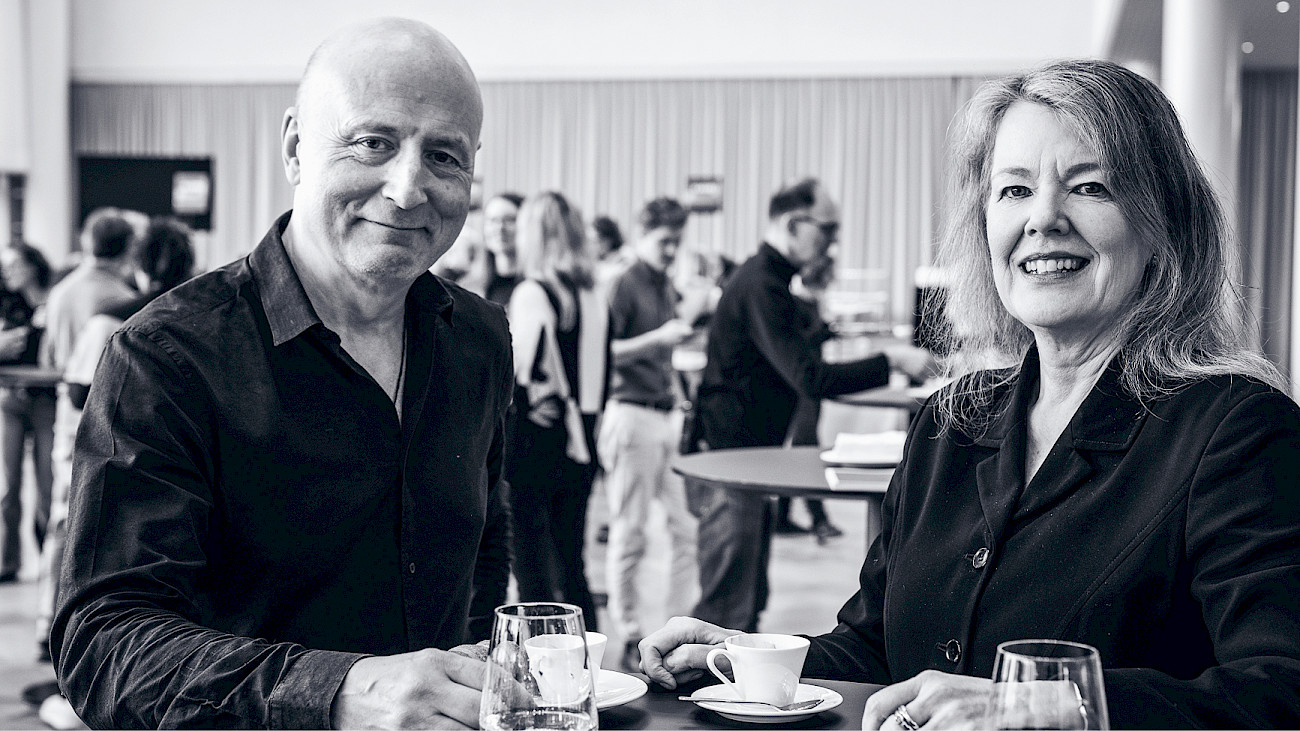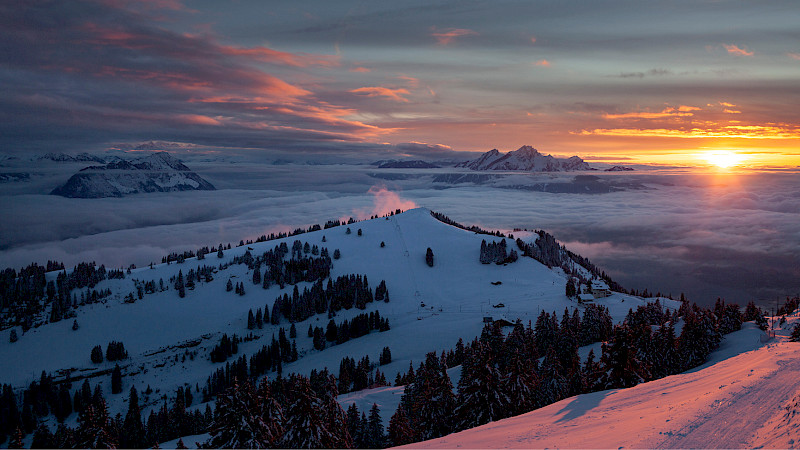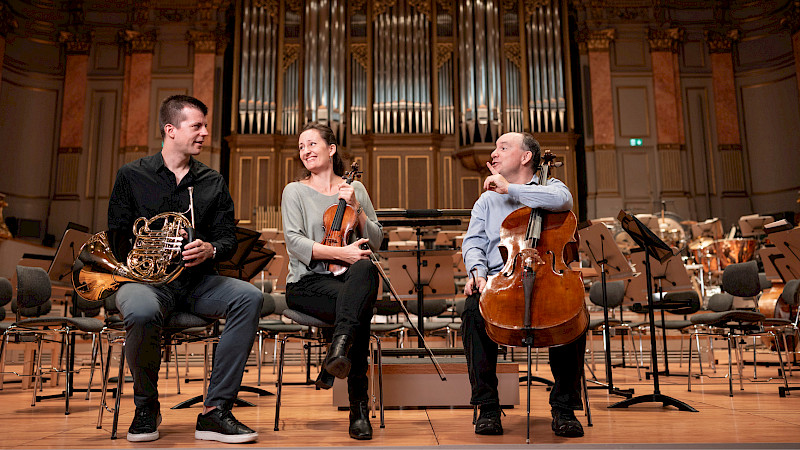
"Always awakening anticipation again"
Regular guests and debuts, Mahler and his environment, tours and locals: Music Director Paavo Järvi and Artistic Director Ilona Schmiel talk about the 2025/26 season.
The new season is just around the corner - how can we summarise what makes it special?
IS Continuity and discovery!
PJ Exactly. Or to go into a little more detail: on the one hand, there are various lines running through the programme that we have been following for some time. The most important one for me is the Mahler cycle, which keeps us busy with two symphonies per season. It's an ambitious endeavour, but so far it's going very well; the orchestra is playing fantastically. On the other hand, we also want to open up new worlds of sound to the audience. This season, it is above all that of the British composer Thomas Adès, who will play a central role as Creative Chair.
IS Sometimes the on the one hand and the other, continuity and discovery come together. Take the Mahler symphony cycle, for example: we always look at what content we can add to it. It starts with songs by Alma Mahler in the "Literature and Music" series and continues with a chamber music version of "Das himmlische Leben" and our digital game "Das magische Sinfonieorchester", in which the ghost is called Gustav and wears an unmistakable little bow tie. We are also planning an English version of this game for our international community - another logical development. The music of Thomas Adès, in turn, in combination with works by the British composers Hannah Kendall and Anna Clyne, enables further discoveries, while at the same time being anchored in the history of our orchestra by the clarinettist and former Focus artist Martin Fröst.
Thomas Adès is one of the most sought-after contemporary composers. What relationship do you have with him?
PJ I don't know him personally yet, but I've been interested in his music for a long time. There are many good composers today, but only a few who stand out with their very own musical language - Thomas Adès is one of them. He is undoubtedly THE British composer of the moment. He also fills a geographical gap for us: In recent years, our Creative Chairs have come from the USA, Iceland, Estonia and Japan; we've never had an Englishman.
IS I first met Thomas Adès in 2007 in Bonn, where his chamber opera "Powder Her Face" was performed. He has long been a favourite candidate for the position of Creative Chair, because for me he manages the perfect balancing act: his works are immediately understandable, even though they are complex; they are attractive for the audience, but also for the musicians. This applies to his large orchestral works and solo concertos as well as his highly interesting chamber music. He also combines different roles. In Zurich, he will not only be discovered as a composer, but also as a conductor and pianist - the latter in a duo with Kirill Gerstein.
The pianist Kirill Gerstein is one of our focus artists, the second focus artist is the cellist Sol Gabetta. What do you have in common with them?
PJ A lot! Both are old friends of mine. Kirill Gerstein is not only a fantastic pianist, he also has a very broad horizon - as a thinking musician who cultivates intensive contacts with many contemporary composers. Sol Gabetta is also a wonderful person, so strong and positive and warm-hearted; in addition to the well-known concerts, she plays many things that others shy away from.
IS You will hear this at her concert with violinist Patricia Kopatchinskaja, for example; the two are known as a duo for their very special and unusual repertoire. And towards the end of the season she will join forces with the cello section of our orchestra, which has developed into its own ensemble in recent years. Sol Gabetta has this openness to engage with completely different constellations. And she is an absolute audience favourite.
Many other long-standing allies will also be performing: Hélène Grimaud, Hilary Hahn, Janine Jansen, Igor Levit, Víkingur Ólafsson, Fazıl Say ..
PJ That really is quite a glamorous list, but above all a very personal one. It's becoming increasingly important for me to be on stage with people I trust not only musically but also as people. I am convinced that the performances will be better if there is a real connection and that the audience can sense this. Of course it's interesting to discover new talent. But for me, performing with friends has a special quality, it's the best experience.
IS You have to remember that a season lasts 45 weeks; you have to create anticipation again and again. This increases when, for example, you can get to know an already familiar soloist in a completely new context or with a surprising repertoire. We therefore think a lot about combinations of conductors, soloists and works. Who suits whom, which composition opens up new horizons, how do we combine the familiar and the unexpected? This mix always includes debuts: we want to introduce new personalities to the audience and the orchestra every season.
What are the most important debuts in the 2025/26 season?
IS I would like to mention four conducting premieres: I am very much looking forward to the French conductor Marie Jacquot, who is making her debut with Beethoven's Violin Concerto and the soloist Augustin Hadelich, but is also getting involved with our Adès focus. Adès himself will also stand in front of the orchestra for the first time, conducting his own piano concerto with Kirill Gerstein as soloist. András Schiff, who has previously worked with the orchestra as a pianist, will now conduct Bach and Beethoven concertos from the piano. And then we have the debut of Florian Helgath, who has already been involved in many successful productions as artistic director of the Zürcher Singakademie. He will also be conducting our orchestra for the first time in Mendelssohn's "Paulus".
PJ I would also like to mention another conductor: Julia Kurzydlak was the winner of our Conductors' Academy 2023/24, she also attended a masterclass at my festival in Pärnu. Now she will be my new Assistant Conductor.
When browsing through the programme, three other things stand out. Firstly, in addition to the Mahler cycle, there is once again a Shostakovich focus. The Jerusalem Quartet is presenting the second part of the string quartets, and Paavo is also conducting three of his works again.
PJ I grew up with Shostakovich's music and love it very much, but I always find it amazing how strongly the Zurich audience and the orchestra react to his works. They speak very specifically about his reality and his time, but somehow there seems to be a very intuitive connection.
IS This connection was also palpable in the incredibly moving interpretation by the Jerusalem Quartet last season. When we were talking about anticipation earlier: I can hardly wait for the second part of this cycle.
Secondly: Paavo, you are conducting works by Arthur Honegger for the first time!
PJ I've wanted to do that for a long time, not just because he was Swiss - he was above all a very good composer. But of course his nationality is an additional argument in favour of us now presenting his works in concert and also recording them on CD. I don't want to talk about duty, that sounds too negative; but it is a mission for us to keep these works alive.
IS There is also a Swiss line alongside Honegger. Conductor Philippe Jordan is returning, composer Rodolphe Schacher is composing a new piece for our family concert "Froschkönig", and Duo Calva is back. We are also strengthening our local roots with special formats: together with other Zurich institutions, we are continuing the "Connect" project, in which we offer dance training sessions to live music for people with Parkinson's or MS. The "classic meets art" series will once again feature concerts in galleries and museums, and the "Kunterwunderbunt" chamber music series in Zurich's community centres is entering its second round. We will also be discussing new approaches to classical music in a "think tank" with former student managers who have gained an insight into our operations over the past ten years.
Thirdly, Messiaen's "Turangalîla" Symphony, a major work of recent decades, will be back on the programme for the first time since 2008.
IS This is also a link to earlier works: Paavo's first CD recording with our orchestra was dedicated to works by Olivier Messiaen. The "Turangalîla" Symphony is now being conducted by Kent Nagano, who knew the composer very well.
PJ Speaking of acquaintances with composers: our former Creative Chair Arvo Pärt will be 90 years old in September, and we are celebrating him with two programmes. That means a lot to me, he's an Estonian icon and I've known him since I was a child. One of the concerts will be performed by my Estonian Festival Orchestra, which has already been a guest in Zurich several times.
Conversely, the Tonhalle-Orchester Zürich will be performing elsewhere again in the 2025/26 season: another tour of Asia is on the cards, as well as a first residency in Baden-Baden.
IS We were last in Japan and South Korea in autumn 2023, and now we are travelling to Japan again; we want to cultivate and expand our relationships there. Like last time, we will be making guest appearances in Seoul and Tokyo and then travelling from Tokyo to other cities by train. In Baden-Baden, on the other hand, we are embarking on a new adventure: we have a three-year partnership with the Festspielhaus for our Mahler cycle. That's a stroke of luck - also because we have an ideal concert hall there for the gigantic Symphony No. 8. Season interview
Finally, a double question: which concert would you recommend to classical music fans? And which one would you recommend to someone who has never been to the Tonhalle Zurich?
PJ If you already know everything, you should definitely listen to a Mahler symphony - it's always exciting to discover new approaches. You're sure to find what you're looking for in the list of soloists. And the fact that you can explore the musical world of Thomas Adès in very different formats is a unique opportunity. Incidentally, perhaps also for those who have never attended a classical concert before: In my experience, younger audiences in particular often find it easier to access contemporary music than, say, a Haydn symphony.
IS In addition to the orchestral programmes, I would like to recommend two organ recitals to both connoisseurs and newcomers: one will be played by our fascinating former Focus artist Iveta Apkalna, the other by the young organist Aurel Dawidiuk. Both present works by Bach in contrast to very different composers: an exciting constellation and a great opportunity to once again experience our Kuhn organ in all its splendour and diversity.





